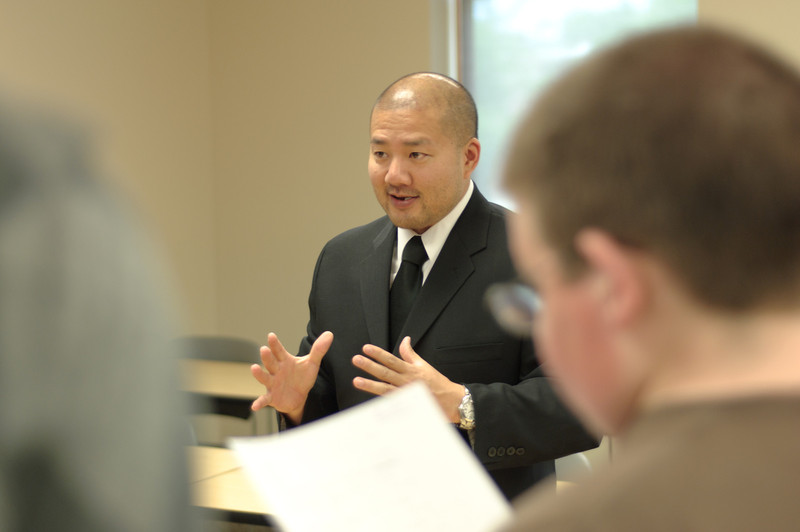Getting to Know: Justice Studies

EDITOR’S NOTE: College Relations is publishing a monthly series of news articles, features and Q&A interviews highlighting various departments on campus in an effort to assist the faculty and staff in gaining an increased awareness about and understanding of each other’s roles and responsibilities.
The February Q&A is with Dr. Jamie Wada, chair of the Justice Studies department.
Q: What are your duties as a department chair?
The chair of the department has several duties and functions. In general, the chair works as the link between the department and the administration. The chair also helps facilitate the daily operations of the department. In essence, the chair has leadership and administrative responsibilities with the ultimate goal of enhancing student learning within the mission of CSC and the Nebraska State College System.
Q: What are the best characteristics or qualities for a student in justice studies to possess?
With any profession, qualities a student needs to possess are: dedication, hard work, accountability, focus, positive attitude, etc. However, the fundamental element is their integrity. Alan Simpson (retired Wyoming Senator) said, “If you have integrity, nothing else matters. If you don't have integrity, nothing else matters.” I think this is critical for students to understand.
Q: What strengths or advantages does your department offer potential CSC students?
The Justice Studies program has multiple benefits for potential CSC students. I have seen many Justice Studies programs. I may be biased, but I do not believe a student could get a better undergraduate education in Criminal Justice or Legal Studies than they would at CSC.
Dr. Bogner, Dr. Leesch, and Dr. Nobiling have all been here for over 20 years. In other words, quality and consistency. Past graduates, who are now in administrative positions know that the graduates they hire from the CSC Justice Studies Department will be the same quality as was expected of them when they were students.
Another important feature of our department is how we teach. When we look at Junior Colleges (JUCOs), they tend to teach practical/operational skills. When we look at R1 universities (i.e. University of Nebraska at Omaha), they tend to teach from a theoretical perspective. We are unique in that if we look at a linear spectrum between a JUCO and an R1, we are somewhere right of center. In other words, we teach enough theoretical skills for a student to be very successful in graduate school or law school, but at the same time we teach practical skills that will be beneficial to students going out into the field.
The Justice Studies department is the fourth largest department on campus. We fluctuate between 130-160 majors. Even though we are a large department our class sizes are still small. A criminal justice student can expect classes to average 25 students, while a legal studies student can anticipate 20 students as a class average. Because of these small class sizes, students receive a very personalized education.
The Justice Studies Department has two unique programs housed within it. First, we have the London Study Abroad program. This program has been ongoing for over 30 years. In the summer, students spend 15 days abroad learning the system and culture of that country. Students are exposed to multiple professional site visits (i.e. police, courts and corrections) as well as multiple cultural outings (i.e. Warwick Castle, Oxford, Cambridge, Stonehenge, etc.). In 2018, students in the London Study Abroad program will be traveling to London and Ireland. The study abroad program is open to all majors and a student can receive up to 6 credits (both graduate and undergraduate).
Secondly, in 2017, the Justice Studies Department initiated the Rural Law Opportunities Program (RLOP). Students accepted into the RLOP program receive a full tuition waiver at CSC. Furthermore, students accepted into the RLOP program, who maintain a specified GPA and receive a specified LSAT score are automatically accepted into the University of Nebraska at Lincoln, School of Law.
Q: How do faculty members keep in touch with CSC graduates regarding their careers and accomplishments?
In the Justice Studies Department, we develop a strong bond with our students. After a student graduates and he or she goes on to graduate school, law school or works in the field, they tend to keep in touch with us. So in most instances, we are apprised of a student’s career, family and accomplishments.
Q: What do you like best about teaching at a small college?
There are many things I like about teaching at Chadron. For students who attend large universities, more likely than not, they never get the opportunity to know their faculty and similarly, faculty never get to know their students. Because we have smaller class sizes, we get to know our students and they get to know us. And because of this, I think, a lasting bond is created. As I mentioned earlier, our graduates tend to stay in touch with us, which is a rarity in most college and university systems.
Secondly, I work with my friends (faculty, staff, and administration). I think one of the most important factors of a job/career is that you like going to work. I enjoy going to work, for many reasons, but primarily because the people I work with are my close friends. So going to work is always a pleasure.
Lastly, I enjoy the community. Most of us are from rural areas. So, sometimes we forget what we have and how lucky we are. We live in a community of very friendly and genuinely nice people. Moreover, in terms of the college, we have a very supportive community. I think it would be difficult to find a town that cares for their college as much as the Chadron community does for CSC.
Category: Campus News, College Relations, Justice Studies

